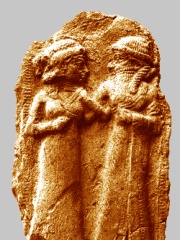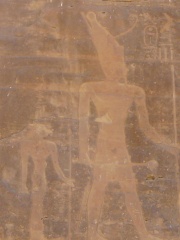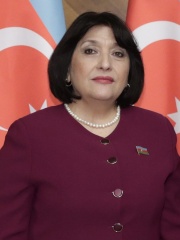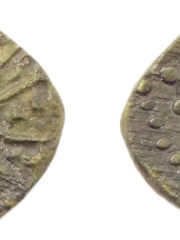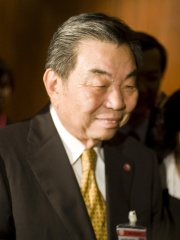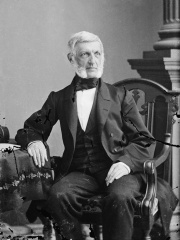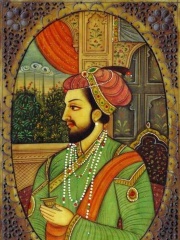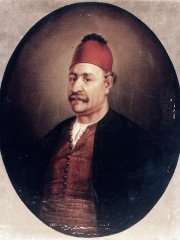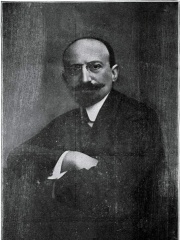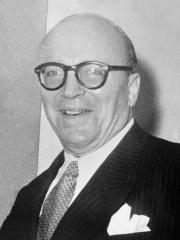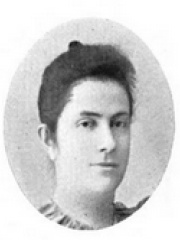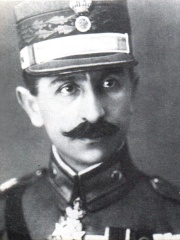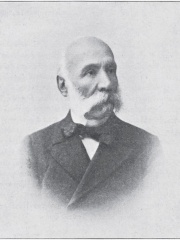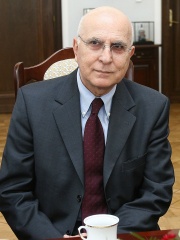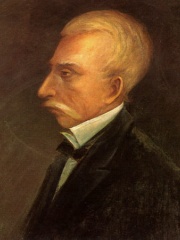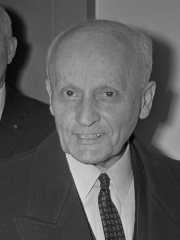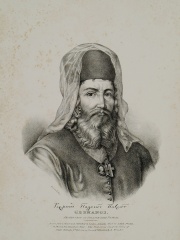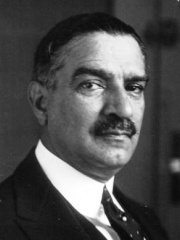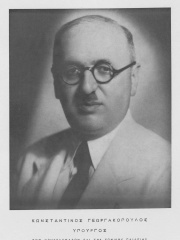Politician
Eurypon
EN.WIKIPEDIA PAGE VIEWS (PV)

 Eurypon
Eurypon
His biography is available in 17 different languages on Wikipedia. Eurypon is the 15,397th most popular politician (down from 12,107th in 2024), the 770th most popular biography from Greece (down from 609th in 2019) and the 335th most popular Greek Politician.
Memorability Metrics
Page views of Eurypon by language
Among Politicians
Among politicians, Eurypon ranks 15,397 out of 19,576. Before him are Dumuzid the Fisherman, Iah, Nicolas Alfonsi, Sahiba Gafarova, Osberht of Northumbria, and Takeshi Iwaya. After him are Ali Muhammad Mujawar, Chavarat Charnvirakul, George Bancroft, René Schick, Semyon Ignatyev, and Shah Jahan III.
Most Popular Politicians in Wikipedia
Go to all RankingsDumuzid the Fisherman
HPI: 55.06
Rank: 15,398
Iah
2200 BC - 2100 BC
HPI: 55.06
Rank: 15,399
Nicolas Alfonsi
1936 - 2020
HPI: 55.06
Rank: 15,400
Sahiba Gafarova
1955 - Present
HPI: 55.06
Rank: 15,401
Osberht of Northumbria
850 - 867
HPI: 55.06
Rank: 15,402
Takeshi Iwaya
1957 - Present
HPI: 55.06
Rank: 15,403
Eurypon
HPI: 55.06
Rank: 15,404
Ali Muhammad Mujawar
1953 - Present
HPI: 55.05
Rank: 15,405
Chavarat Charnvirakul
1936 - Present
HPI: 55.05
Rank: 15,406
George Bancroft
1800 - 1891
HPI: 55.05
Rank: 15,407
René Schick
1909 - 1966
HPI: 55.05
Rank: 15,408
Semyon Ignatyev
1904 - 1983
HPI: 55.05
Rank: 15,409
Shah Jahan III
1711 - 1772
HPI: 55.05
Rank: 15,410
In Greece
Among people born in Greece, Eurypon ranks 770 out of NaN. Before him are Antonios Pepanos (1866), Jimmy Makulis (1935), Andreas Miaoulis (1769), Dimitrios Maximos (1873), Kostas Tsimikas (1996), and Stefanos Stefanopoulos (1898). After him are Kalliroi Parren (1861), Androsthenes of Thasos (-400), Alexandros Othonaios (1879), Alki Zei (1925), Georgios Athanasiadis-Novas (1893), and Theodoros Diligiannis (1820).
Others born in Greece
Go to all RankingsAntonios Pepanos
POLITICIAN
1866 - 1918
HPI: 55.14
Rank: 764
Jimmy Makulis
SINGER
1935 - 2007
HPI: 55.14
Rank: 765
Andreas Miaoulis
MILITARY PERSONNEL
1769 - 1835
HPI: 55.10
Rank: 766
Dimitrios Maximos
POLITICIAN
1873 - 1955
HPI: 55.09
Rank: 767
Kostas Tsimikas
SOCCER PLAYER
1996 - Present
HPI: 55.08
Rank: 768
Stefanos Stefanopoulos
POLITICIAN
1898 - 1982
HPI: 55.07
Rank: 769
Eurypon
POLITICIAN
HPI: 55.06
Rank: 770
Kalliroi Parren
WRITER
1861 - 1940
HPI: 55.05
Rank: 771
Androsthenes of Thasos
EXPLORER
400 BC - 360 BC
HPI: 55.04
Rank: 772
Alexandros Othonaios
MILITARY PERSONNEL
1879 - 1970
HPI: 55.02
Rank: 773
Alki Zei
WRITER
1925 - 2020
HPI: 54.95
Rank: 774
Georgios Athanasiadis-Novas
POLITICIAN
1893 - 1987
HPI: 54.94
Rank: 775
Theodoros Diligiannis
POLITICIAN
1820 - 1905
HPI: 54.92
Rank: 776
Among Politicians In Greece
Among politicians born in Greece, Eurypon ranks 335. Before him are Stavros Dimas (1941), Carlo II Tocco (1450), Dimitrios Valvis (1814), Antonios Pepanos (1866), Dimitrios Maximos (1873), and Stefanos Stefanopoulos (1898). After him are Georgios Athanasiadis-Novas (1893), Theodoros Diligiannis (1820), Panagiotis Pipinelis (1899), Germanos III of Old Patras (1771), Andreas Michalakopoulos (1875), and Konstantinos Georgakopoulos (1890).
Stavros Dimas
1941 - Present
HPI: 55.32
Rank: 329
Carlo II Tocco
1450 - 1448
HPI: 55.22
Rank: 330
Dimitrios Valvis
1814 - 1892
HPI: 55.17
Rank: 331
Antonios Pepanos
1866 - 1918
HPI: 55.14
Rank: 332
Dimitrios Maximos
1873 - 1955
HPI: 55.09
Rank: 333
Stefanos Stefanopoulos
1898 - 1982
HPI: 55.07
Rank: 334
Eurypon
HPI: 55.06
Rank: 335
Georgios Athanasiadis-Novas
1893 - 1987
HPI: 54.94
Rank: 336
Theodoros Diligiannis
1820 - 1905
HPI: 54.92
Rank: 337
Panagiotis Pipinelis
1899 - 1970
HPI: 54.76
Rank: 338
Germanos III of Old Patras
1771 - 1826
HPI: 54.58
Rank: 339
Andreas Michalakopoulos
1875 - 1938
HPI: 54.44
Rank: 340
Konstantinos Georgakopoulos
1890 - 1973
HPI: 54.34
Rank: 341
